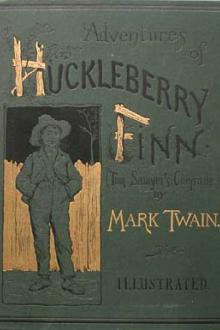Lost in the Forest: Wandering Will's Adventures in South America, Ballantyne [shoe dog free ebook .txt] 📗

- Author: Ballantyne
Book online «Lost in the Forest: Wandering Will's Adventures in South America, Ballantyne [shoe dog free ebook .txt] 📗». Author Ballantyne
The costume of these wanderers, like their small possessions, was varied. All wore white duck trousers and blue Guernsey or cotton shirts with sou’-westers or straw hats, but the coats and cravats differed. Larry wore a rough pilot-cloth coat, and, being eccentric on the point, a scarlet cotton neckerchief. Old Peter wore a blue jacket with a black tie, loosely fastened, sailor fashion, round his exposed throat. Muggins wore the dirty canvas jacket in which he had been engaged in scraping down the masts of the Rover when he left her. Will Osten happened to have on a dark blue cloth shooting-coat and a white straw hat, which was fortunate, for, being in reality the leader of the party, it was well that his costume should accord with that responsible and dignified position. They had no weapons of any kind, so their first care was to supply themselves with stout cudgels, which each cut in proportion to his notions of the uses and capacities of such implements—that of Larry O’Hale being, of course, a genuine shillelah, while the weapon cut by Muggins was a close imitation of the club of Hercules, or of that used by the giant who was acquainted with the celebrated giant-killer named Jack!
“Now, boys, if we’re goin’ to ait and slaip, the sooner we set about it the better,” observed Larry, rising and commencing to collect sticks for a fire. The others immediately followed his example, and in a few minutes a bright blaze illuminated the dark recesses of the tangled forest, while myriads of sparks rose into and hung upon the leafy canopy overhead. There was something cheering as well as romantic in this. It caused the wanderers to continue their work with redoubled vigour. Soon a fire that would have roasted an ox whole roared and sent its forked tongues upwards. In the warm blaze of it they sat down to their uncommonly meagre supper of half a biscuit and a small bit of cheese each—which was washed down by a draught from a neighbouring stream.
They had finished this, and were in the act of lighting their pipes, when a roar echoed through the woods which caused them to pause in their operations and glance uneasily at each other.
“Sure, it’s a tiger!” exclaimed Larry.
“There’s no tigers in them parts,” said Muggins.
“I don’t know that, lad,” observed Old Peter.
“I’ve hear’d that there are jaguars an’ critters o’ that sort, which is as big and as bad as tigers, an’ goes by the name, but p’raps—”
Old Peter’s observations were here cut short by the loud report of a gun close at hand. As if by instinct every man leaped away from the light of the fire and sheltered himself behind a tree. For some time they stood listening eagerly to every sound, but no foe appeared, nor was there a repetition of the shot. The longer they listened the more inclined were they to believe that their senses had deceived them, and Larry O’Hale’s heart was beginning to make a troublesome attack on his ribs, as he thought of ghosts—especially foreign ghosts—when all eyes were attracted to a human form which appeared to flit to and fro among the tree stems in the distance, as if to avoid the strong light of the fire.
Knowing that one man with a gun could make certain of shooting the whole party if he chose, and that he would not be more likely to attempt violence if trust in his generosity were displayed, Will Osten, with characteristic impetuosity, suddenly walked into the full blaze of the firelight and made signals to the stranger to approach. Larry and the others, although they disapproved of the rashness of their young leader, were not the men to let him face danger alone. They at once joined him, and awaited the approach of the apparition.
It advanced slowly, taking advantage of every bush and tree, and keeping its piece always pointed towards the fire. They observed that it was black and partially naked.
Suddenly Muggins exclaimed— “I do b’lieve it’s—” He paused.
“Sure, it’s the nigger—och! av it isn’t Bunco!” cried Larry.
Bunco it was, sure enough, and the moment he perceived that he was recognised, he discarded all precaution, walked boldly into the encampment, and shook them all heartily by the hand.
“Sure yer face is a sight for sore eyes, though it is black and ugly,” exclaimed Larry, as he wrung the hand of the good-humoured native, who grinned from ear to ear with delight at having found his friends.
“Wot ever brought ye here?” inquired Muggins.
“Mine legses,” replied Bunco, with a twinkle in his coal-black eyes.
“Yer legses, eh?” repeated Muggins in a tone of sarcasm—“so I supposes, for it’s on them that a man usually goeses; but what caused you for to desart the ship?”
“’Cause I no want for be pyrit more nor yourself, Mister Muggles—”
“Muggins, you lump of ebony—don’t miscall me.”
“Well, dat be all same—only a litil bit more ogly,” retorted Bunco, with a grin, “an’ me no want to lose sight ob Doctor Os’n here: me come for to show him how to go troo de forest.”
“That’s right, my good fellow,” cried Will, with a laugh, slapping the native on the shoulder; “you have just come in the nick of time to take care of us all, for, besides having utterly lost ourselves, we are quite ignorant of forest ways in this region—no better than children, in fact.”
“True for ye, boy, riglar babes in the wood, as I said before,” added Larry O’Hale.
“Well, that being the case,” continued Will, “you had better take command at once, Bunco, and show us how to encamp, for we have finished our pipes and a very light supper, and would fain go to sleep. It’s a pity you did not arrive sooner, my poor fellow, for we have not a scrap of food left for you, and your gun will be of no use till daylight.”
To this Bunco replied by displaying his teeth and giving vent to a low chuckle, while he lifted the flap of his pea-jacket and exhibited three fat birds hanging at the belt with which he supported his nether garments.
“Hooray!” shouted Larry, seizing one of the birds and beginning to pluck it; “good luck to your black mug, we’ll ait it right off.”
“That’s your sort,” cried Muggins, whose mouth watered at the thought of such a delightful addition to his poor supper. “Hand me one of ’em, Larry, and I’ll pluck it.”
Larry obeyed; Old Peter seized and operated on the last bird, and Bunco raked the embers of the fire together, while Will Osten looked on and laughed. In a very few minutes the three birds were plucked and cleaned, and Larry, in virtue of his office, was going to cook them, when Will suggested that he had better resign in favour of Bunco, who was doubtless better acquainted than himself with the best modes of forest cookery. To this Larry objected a little at first, but he was finally prevailed on to give in, and Bunco went to work in his own fashion. It was simple enough. First he cut three short sticks and pointed them at each end, then he split each bird open, and laying it flat, thrust a stick through it, and stuck it up before the glowing fire to roast. When one side was pretty well done he turned the other, and, while that was cooking, cut off a few scraps from the half-roasted side and tried them.
We need scarcely add that none of the party were particular. The birds were disposed of in an incredibly short time, and then the pipes were refilled for a second smoke.
“How comes it,” inquired Will, when this process was going on, “that you managed to escape and to bring a gun away with you? We would not have left the ship without you, but our own escape was a sudden affair; we scarcely expected to accomplish it at the time we did. I suppose you had a sharp run for it?”
“Run! ductor, no, me no run—me walk away quite comfrabil an’ tooked what me please; see here.”
As he spoke, Bunco opened a small canvas bag which no one had taken notice of up to that moment, and took from it a large quantity of broken biscuit, a lump of salt beef, several cocoa-nuts, a horn of gunpowder, and a bag of shot and ball—all of which he spread out in front of the fire with much ostentation. The satisfaction caused by this was very great, and even Muggins, in the fulness of his heart, declared that after all there were worse things than being lost in a forest.
“Well, and how did you manage to get away?” said Will, returning to the original question.
“Git away? why, dis here wos de way. When me did see the rincumcoshindy goin’ on ashore, me say, ‘Now, Bunco, you time come; look alive;’ so, w’en de raskil called de fuss mate orders out de boat in great hurry, me slip into it like one fish. Then dey all land an’ go off like mad into de woods arter you—as you do knows. Ob coorse me stop to look arter de boat; you knows it would be very bad to go an’ leave de boat all by its lone, so w’en deys gone into de woods, me take the mate’s gun and poodair an’ shot an’ ebbery ting could carry off—all de grub, too, but der worn’t too moche of dat—and walk away in anoder d’rection. Me is used to de woods, you sees, so kep’ clear o’ de stoopid seamans, who soon tires der legses, as me knows bery well; den come round in dis d’rection; find you tracks; foller im up; shoots tree birds; sees a tiger; puts a ball in him skin, an’ sends him to bed wid a sore head—too dark for kill him—arter which me find you out, an’ here me is. Dere. Dat’s all about it.”
“A most satisfactory account of yourself,” said Will Osten.
“An’ purtily towld,” observed Larry; “where did ye larn English, boy, for ye have the brogue parfict, as me gran’mother used to say to the pig when she got in her dotage (me gran’mother, not the pig), ‘only,’ says she, ‘the words isn’t quite distinc’.’ Couldn’t ye give us a skitch o’ yer life, Bunco?”
Thus appealed to, the gratified native began without hesitation, and gave the following account of himself:—
“Me dun know when me was born—”
“Faix, it wasn’t yesterday,” said Larry, interrupting.
“No, nor de day before to-morrow nother,” retorted Bunco; “but it was in Callyforny, anyhow. Me fadder him wos a Injin—”
“Oh! come!” interrupted Muggins in a remonstrative tone.
“Yis, him wos a Injin,” repeated Bunco stoutly.
“Wos he a steam-ingine?” inquired Muggins with a slight touch of sarcasm.
“He means an Indian, Muggins,” explained Will.
“Then why don’t he say wot he means?





Comments (0)